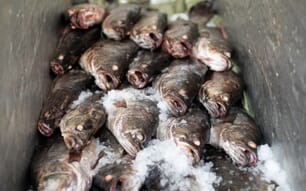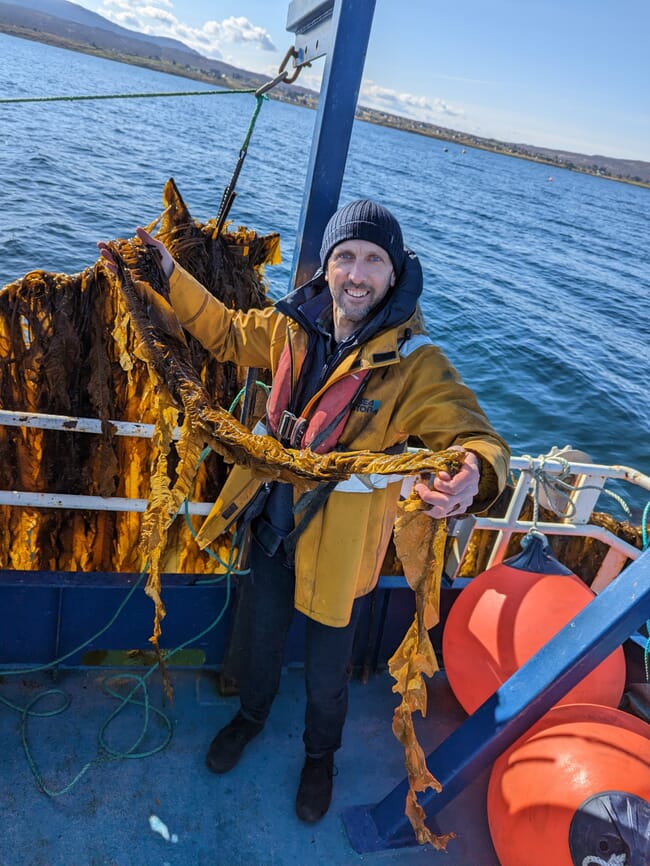
© BioMara
The chicken and egg situation that’s frustrating the West’s nascent seaweed industry is well-documented: growers can’t raise investment without the promise of profitable long-term offtake agreements for their crops, while processors can’t flourish without the prospect of an affordable and reliable local supply.
It’s a situation that’s stifling the growth of the sector: despite a huge groundswell of goodwill and some not insubstantial grant funding packages, it’s not yet been able to reach critical mass.
Despite this precarious situation there are still numerous industry players making a strong case for their projects. Including Jay Dignan, the founder of BioMara – a startup that’s looking to sell its fucoidan and food ingredients globally – who remains committed to the cause.
Dignan’s previous career involved two decades in finance and startups, where he was involved in a wide range of projects – from media M&A, to a deep sea salvaging company, to an ethical clothes business that involved touring the Tibetan plateau with nomadic Yak herders. It was not until he undertook an MBA that he first encountered the business case for seaweed, through Gavin Simpson – who has since become Dignan’s business partner and the cornerstone investor in BioMara.
At the time Simpson was looking for a sustainable development project on the Isle of Mull, where he had family connections, and decided to help launch a community-based seaweed farm, called Aird Fada, in the southwest corner of the island, bringing Dignan on board to help set it up.
“Gavin donated £100,000 to the community to build the farm and, alongside Morven Gibson [the farm manager at the time], I built the financial model and helped negotiate a couple of deals. It was an absolutely perfect introduction to the seaweed world and a really necessary place to start, in my opinion. It all starts with the farmers who are seeding, growing, harvesting and stabilising the seaweed for us, the processor. Scaling quality supply is one of the key challenges,” Dignan reflects.
From grower to processor
However, while Aird Fada proved promising, Dignan swiftly realised that there was a stark mismatch between its production costs and the price that processors were prepared to pay.
“To break even the farmer needed a price that was four times more than processors were asking for,” he recalls.
As a result he decided to head downstream in the value chain and see if – and how – it would be possible to develop in-demand seaweed-based products that would allow them to meet the farmers’ asking price for the raw seaweed, while still ensuring a profitable business model.
“That was the essence of BioMara. It’s about using bioprocessing technologies to add value to the seaweed once it’s been harvested on the farm. We’ve optimised for fucoidans and food ingredients that are in huge demand around the world, so we can pay a fair price to farmers, which will help scale the whole industry from the upstream point of view,” Dignan explains.
A focus on fucoidan
His research suggested that production of fucoidan – which is present in all brown seaweed species and is used mainly in the nutraceutical industry – would be the best bet. He then built a diverse team with different skillsets including tracking down one of the UK’s few resident fucoidan experts, Loic de Carvalho, who had recently completed his PhD on the subject. Loic joined the startup alongside Carlos Vanegas and Inga Mikneviciute, who had previously been responsible for commissioning the Mara Seaweed processing plant.
“Fucoidan characteristics depend on the location, on the harvest date and – crucially – on the processing. We decided to focus on nutraceuticals, as this is where’s there’s the best price. That focus underlines the whole business model. If you don’t have the value of the different components of the seaweed being worth more than the value of the whole through the extraction process then it just doesn’t work for scaling the industry in the West – it’s the only way,” Dignan points out.
“We’ve seen that in the past in the energy industry – decades and tens of millions [of dollars] from energy companies being poured into the seaweed sector for biofuels but nothing came of it,” he adds.
This is the reason that Dignan decided to avoid focusing on lower value, higher volume products, such as bioplastics.
“Even though fucoidan is only a small part of the biomass, it will account for a big portion of the revenue we’ll get from that biomass,” he notes.
“We’re staying lean and nimble while we develop customer relationships in the nutraceutical and functional food ingredients markets with the range that we have. Once we increase our traction, we will build other projects around the residual streams using our biorefinery approach,” he adds.
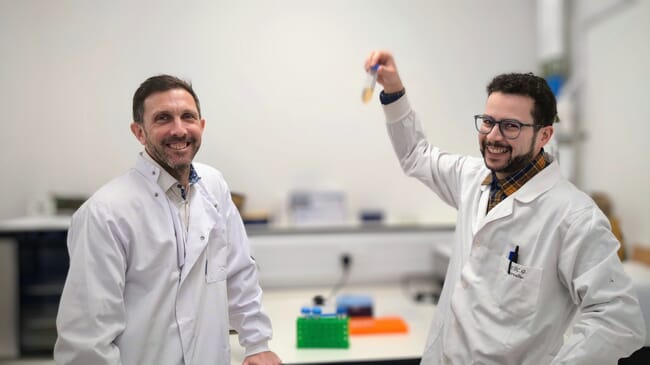
© BioMara
While Dignan is committed to helping the supply chain to scale, he appreciates that there’s still a lot of work to do, particularly in the UK, where annual tonnages of farmed seaweed are barely hitting four figures.
As a result he’s currently looking to source from farms in Norway and the Faroe Islands, but despite the larger scale of Scandinavian farms, he notes that the prices remain too high for many applications.
“The cost of growing and harvesting in the West is going to remain high, which means that our business model – adding that value – is the only way we can help it to grow,” he insists.
According to Dignan, the average break-even cost of kelp production in the UK is probably between £3 and £4 per kg (wet weight).
“I think they could get below £2 per kilo in the UK in a few years depending on the farming models – I think it will happen, but the only way for it to happen is for the likes of BioMara to be able to deliver offtake agreements so they can scale. It’s the same story everywhere,” he explains.
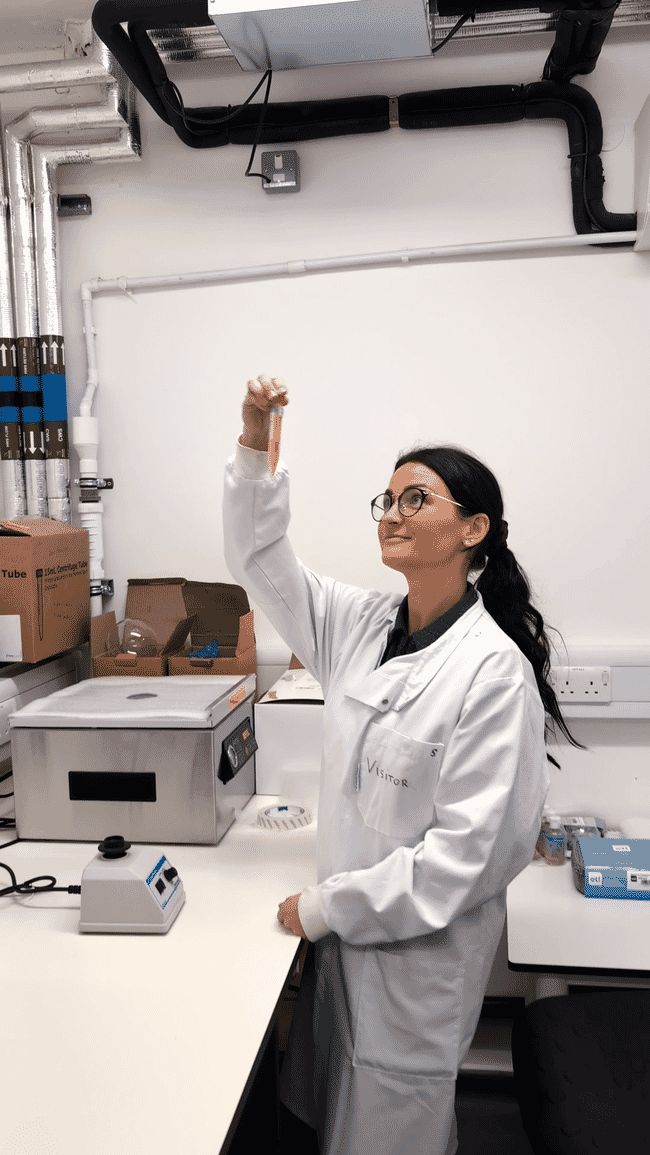
© BioMara
Prospects in the food ingredients sector
Dignan believes that once the fucoidan has been extracted one of the most promising applications for the remaining biomass is in the food sector. The company is involved in a £600,0000 Innovate UK-funded project called Better Food for All, which is being undertaken in collaboration with Abertay University and Macphie, a downstream food manufacturer.
“Seaweed has high fibre, high protein, is full of vitamins and minerals, and could be used as a replacement for flour in something like bread. We’ve tested it in muffins and also sausages so far. We will produce bread in industrial-scale facilities for human trials, to prove, not only the health benefits, but also understand consumers perception of the taste, the smell and the texture,” he explains.
Next steps
BioMara is currently working on scaling up production with the aim to build a demonstration-scale facility in the UK that would have the capacity to process over 1,000 tonnes of fresh seaweed a year.
“Someone like Ocean Rainforest might be able to supply that, but we’d have to plan that out in advance to make sure they could seed their lines,” Dignan notes.
“Meanwhile in the UK it’s going to be even harder: because of the issues with getting licences approved, making sure there’s a sufficient supply is going to be a big challenge. But we want to talk to all the UK producers, because they need support and they need offtake agreements. We can’t make any promises until we raise the funds, but when we do, we need to make sure that they are seeding their lines for the following year. That will give them confidence and allow them to talk to their investors so that they can scale up as well and we can build this industry together,” he concludes.
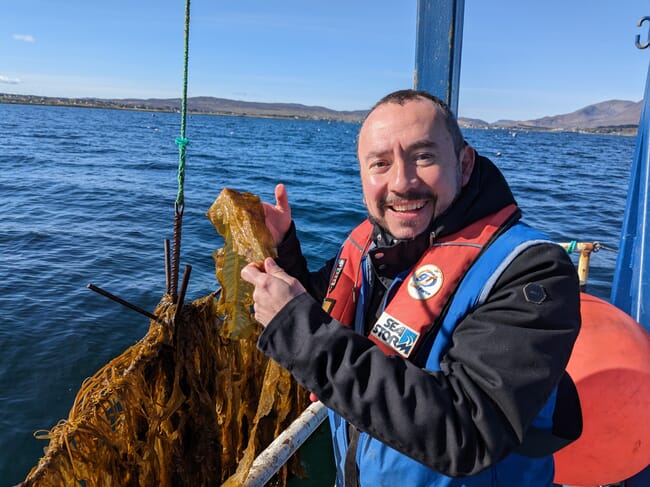
© BioMara



